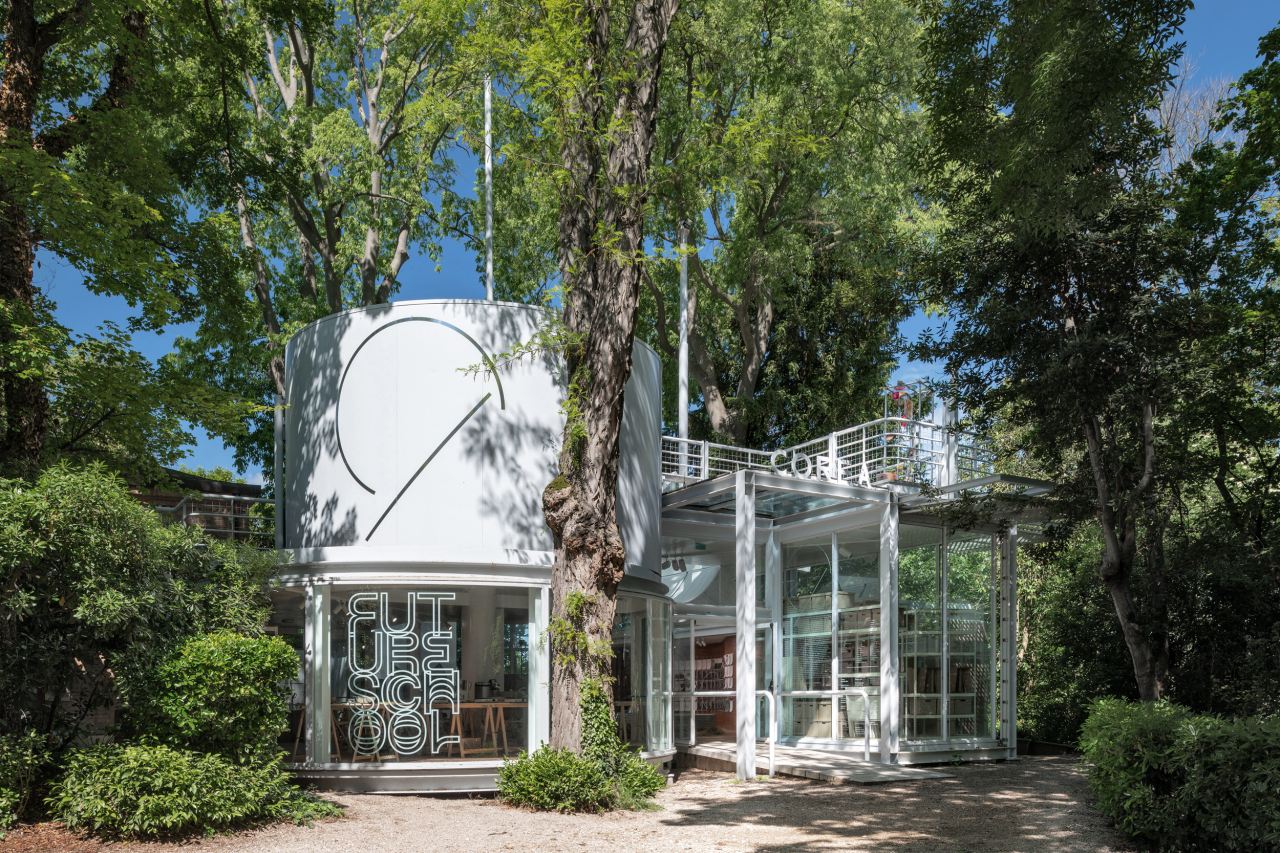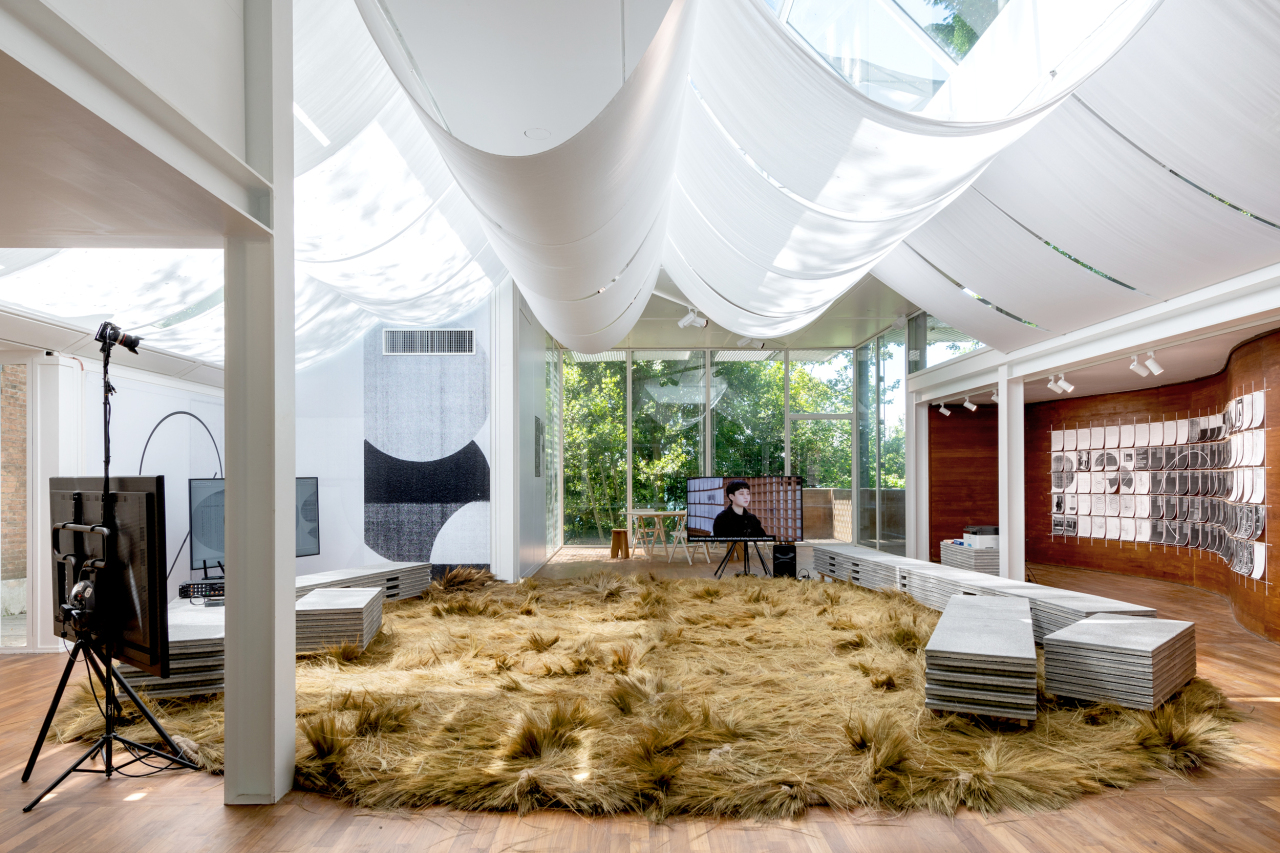 |
The Korean Pavilion at the 2021 Venice Architecture Biennale (Arts Council Korea) |
Curator Shin Hae-won of the Korean Pavilion at the 2021 Venice Architecture Biennale has agonized over how to bring people together to discuss climate crisis, diaspora and innovation.
Although those themes may seem comparatively less relevant for an architecture exhibition, Shin believes architecture is not just a physical thing but something that reflects our lives and the issues that we currently face.
The Korean Pavilion has been turned into “Future School” at the biennale which opened last month. Acting as a global discussion platform, the exhibition space facilitated collective thinking by bringing together architects, educators, artists, theorists and advocates. It is envisioned as a shared place for gathering, learning and contemplation.
 |
Shin Hae-won, curator of the Korean Pavilion at the 2021 Venice Architecture Biennale, poses for a photo at the Arko Art Center in Seoul, Thursday. (Park Hyun-koo/The Korea Herald) |
"Architecture is a convergence field. People typically think that architects design buildings. But we should approach the field with more multidisciplinary perspective,” Shin told The Korea Herald on Thursday at the Arko Art Center in Seoul. “If a house expands, it becomes a city and a city is a space that contains people’s lives. That’s why casting a variety of questions is really important as much as we physically build structures.”
Shin has set up an environment similar to that of the Korean Pavilion at the Arko Art Center in Seoul as a base camp where people can view the Venice exhibition and participate in online discussions with people from around the world.
A total of 61 countries are participating in the international architecture biennale, which runs through Nov. 21 in Venice, Italy, under the theme of “How will we live together” directed by chief curator Hashim Sarkis.
Shin came up with the idea to virtually connect the two cities -- Venice and Seoul -- before the pandemic hit. The idea has become even more relevant in the pandemic times. “Art is always one step ahead,” she said.
The program called Generative Dialogues forms the core of Future School. The program is an open conversation in which diverse parties join in to generate new ideas and actions. The dialogue takes place every Saturday at 4 p.m. in Seoul and 9 a.m. in Venice. The schedule can be found at the Future School Online, www.futureschool.kr.
“Everybody is interested in what they are doing, and they are very comfortable presenting their agenda. But we are not used to listening to what others are doing,” Shin said of the Generative Dialogues.
 |
An installation view of the Korean Pavilion at the 2021 Venice Architecture Biennale in Venice, Italy (Arts Council Korea) |
The Future School showcases around 50 programs on the online platform. Some 200 people are participating in the programs which include “Future School Lunchcare for Climate,” “Imagined Diaspora,” “Architecture Playshop,” “Atelier Collaborative,” and “Cool City.”
“We have presented Korean features at the Korean Pavilion many times, but we can also provoke questions at the universal level in an experimental way. I think Korea has the clout to lead the initiative,” she said.
Shin also initiated the Curators Collective to brainstorm ideas and shared interests to strengthen solidarity among curators while preparing for the biennale. Since the first meeting on May 23, 2020, curators across the globe have gathered every month and the meeting has grown into an exploration of collaborative possibilities for the 2021 biennale and beyond.
“After the pandemic hit, I thought to myself, ‘How can I forge solidarity and practice harmony at this time?’ We were all disconnected at the time, and I assumed other curators might have similar concerns too. I wanted to start a spark talking about it,” she said.
The Curators Collective has published two statements so far.
“This is not result-oriented. The process itself, that we initiate dialogues to share knowledge, is meaningful,” she said.
When it comes to architecture, she stressed that peoples’ lives make up the foundation of space.
“We need to contemplate on our lives. The process is important,” she said. “We need to participate in discussions and think about many ongoing issues that we face routinely. That is why I brought up the concept of school.”
By Park Yuna (
yunapark@heraldcorp.com)







![[Exclusive] Hyundai Mobis eyes closer ties with BYD](http://res.heraldm.com/phpwas/restmb_idxmake.php?idx=644&simg=/content/image/2024/11/25/20241125050044_0.jpg)
![[Herald Review] 'Gangnam B-Side' combines social realism with masterful suspense, performance](http://res.heraldm.com/phpwas/restmb_idxmake.php?idx=644&simg=/content/image/2024/11/25/20241125050072_0.jpg)

